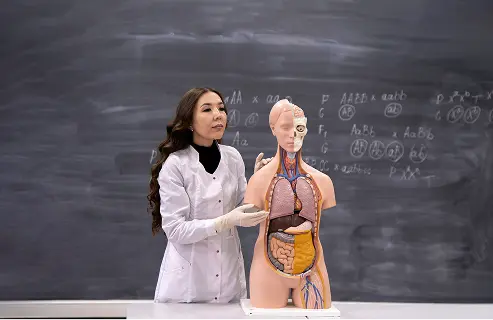Build new and in-demand skills with SAE short courses – standalone learning designed to support your personal and career goals through flexible, focused training.

This course introduces the R programming language to healthcare professionals with no prior programming experience. It focuses on applying R to manage, analyze, and visualize health data, enabling evidence-based decision-making and improved healthcare outcomes.

This course introduces the Python programming language to students and professionals in biomedical and healthcare fields with no prior programming experience.

Human nutrition is the science that studies about nutritional components of foods crucial for the wellbeing of the human body…

This course is an introductory unit to biochemistry. By the end of the course, you will be able to recognize the various molecules that give rise to living systems…

The Introduction to Anatomy & Physiology introduces essential concepts in human anatomy and physiology and the structure and function of the human body…

This course introduces the R programming language to healthcare professionals with no prior programming experience. It focuses on applying R to manage, analyze, and visualize health data, enabling evidence-based decision-making and improved healthcare outcomes.

This course introduces the Python programming language to students and professionals in biomedical and healthcare fields with no prior programming experience.

Human nutrition is the science that studies about nutritional components of foods crucial for the wellbeing of the human body…

This course is an introductory unit to biochemistry. By the end of the course, you will be able to recognize the various molecules that give rise to living systems…

The Introduction to Anatomy & Physiology introduces essential concepts in human anatomy and physiology and the structure and function of the human body…
A microcredential is a shortform of learning that according to the Australian government is between an hour to smaller than an award qualification (ie Diploma, Bachelors or Masters Degree). It has formal assessment and may provide credit towards an award qualification. Microcredentials are a fast, practical way to upskill or reskill in the shortest possible time.
Both microcredentials and short courses focus on a specific topic area or skill set and are designed to meet the needs of learners, employers and industry.
A short course does not contribute credit towards an award qualification and is not recorded on an academic transcript. Students who complete a short course are provided with an RMIT Certificate of Completion.
There are two key reasons employers value microcredentials – they demonstrate initiative, and provide concrete evidence that you’ve developed specific, transferable skills and knowledge.
Microcredential courses are the ideal supplement to your professional skills, helping you to stay abreast of developments within your industry. They’re also a great way to branch out, expand your knowledge base or dip your toe into a new field.
IHM acknowledges the Traditional Owners of country throughout Australia and recognises
their continuing
connection to land, waters and culture. We pay our respects to their Elders past,
present and emerging.